Are you buying a fifth wheel? How much do you know about fifth wheel hitches? If you are like most RV shoppers, you probably don’t know much about them. I know when I was looking for that perfect RV, the last thing I was thinking about was the hitch. In this article, I’m going to go over the basics of fifth wheel hitches and what you need to have a safe towing experience.
Before I jump into all the details, I’d like to go over some important terms and definitions. I know, not very exciting, but it will help you understand the rest of the article better and give you some key terms that you can use for your new fifth wheel hitch research.
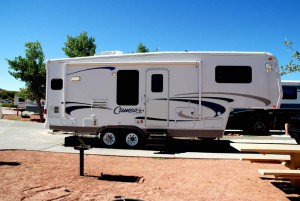
Hitch Coupler – Flat part of the hitch that resides in the bed of your pick-up truck and interfaces with the fifth wheel trailer. The assembly is either bolted or welded to the truck frame.
King Pin – The portion of the hitch that is permanently attached to the fifth wheel trailer. It connects to the hitch coupler and allows the RV to pivot when being towed.
Hitch Locking Leveler – Locks down on the bar that is used to release the receiver from the fifth wheel pin box. You’ll want a lock for this to prevent the fifth wheel from detaching.
Slider Fifth Wheel Hitch – Slides forward and backward in the bed of the truck to provide an optimal ride when going straight and optimal turning angle when maneuvering (prevents the trailer for hitting the cab during tight turns). Not necessary for long bed trucks.
Extended Pin Box – Another device recommended for towing with a short bed truck. It also prevents the trailer from hitting the cab during tight turns.
Mounting Rails – Are securely fastened to the truck bed and are needed to attach a fifth wheel hitch to your truck bed. The hitch coupler attaches to the mounting rails.
Pucks – Attachments in the bed of your truck that indicate that it has underbed hitch prep package. The mounting rails are located under the bed of the truck.
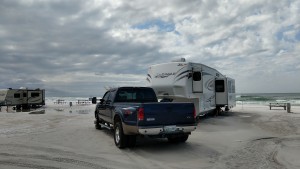
What kind of Truck will you use for Towing?
First thing you need to determine is if the truck you plan to use for towing can actually pull your fifth wheel. Do not take just anyone’s word for it! Pull out that user manual or go to the manufacturers website and research it for yourself.
How long is the truck bed? A long-bed truck (8 ft long) will be able to use a traditional fifth wheel hitch. Anything less than 8 ft will need a slider fifth wheel hitch and extended pin box for best towing. A properly installed fifth wheel hitch should sit in front of the truck’s rear axle. This is easy to achieved with a long bed truck, but not a short bed.
Does the truck have a plastic liner? If so, you will have to cut a hole to accommodate a fifth wheel hitch. Additionally, you will be unable to use a slider hitch.
Are there pucks in the truck bed? If so, make sure to get a hitch that is designed to attach to them.
Does truck bed have metal rails that go from left to right? If so, you have fifth wheel hitch rails and need a hitch designed to fit those rails.
What truck do you have? You can find a hitch made specifically for your Make, model, and year for best fit. Otherwise you can get a universal hitch.
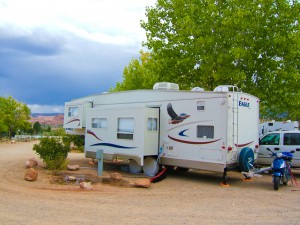
Traditional Fifth Wheel Hitch (long bed trucks)
If you decide to go with a traditional fifth wheel hitch, there are few things to keep in mind. Think about going down the road with your rig, you know that you will rarely find a smooth road. Your hitch will be bumped and jostled as you go down the road.
There are two main types of traditional fifth wheel hitches: 1) Standard Fixed Hitch, 2) Air Ride
Standard Fixed Hitch
As the name implies, this hitch is fixed in place and has no cushioning.
To help with minimizing the effects of bumps along the road, you can purchase padded pin boxes.
Pros: Light weight, inexpensive. Pin boxes can move from truck to truck.
Cons: You will still feel some of those bumps
Air Ride
The air ride is an all-in-one system that cushions against bumps along the road.
Pros: high quality, anti-shock system
Cons: heavy, expensive, difficult to move from one truck to another
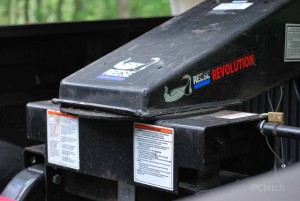
Slider Fifth Wheel Hitch (short bed trucks)
Some argue that newer fifth wheels are designed in such a way that slider hitches are no longer needed. I think for an unquestionably safe ride, you should get a slider.
There are two basic types: 1) manual, 2) automatic
Manual Sliding Hitch
As the name implies, you must manually slide the hitch.
Here’s the process:
a) Stop the truck and pull the slide release lever
b) Get back in the truck and pull forward until you hear the hitch lock into place (tight maneuvering position)
c) Make all your tight turns/maneuvering
d) Stop truck and pull the slide release lever
e) Get back in the truck and back up until you hear the hitch lock into place (towing position)
It’s simple enough, but will you want to get in and out of truck each time you need to slide the hitch around? Also, what is the likelihood that you could have the hitch in the wrong position? And…the sound of the hitch locking into place can be a bit jarring, especially the first few times you do this.
Auto Sliding Hitch
This hitch engages automatically. So you can skip all that stopping, pulling the slide release lever, hopping back in, moving truck, hopping back out, etc.
Sounds amazing right?
It is, but it is more expensive and weighs a whole lot more than the manual sliding hitch.
Only you can decide if it is worth it.
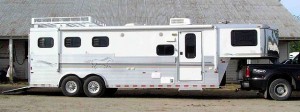
Gooseneck Adapter
If you already have your truck and have a towing system for a gooseneck trailer, you can get an adapter that will allow you pull your fifth wheel.
Some adapters attach to your gooseneck ball or use the ball hose of your gooseneck hitch. This allow you to hook up your fifth wheel without having to modify it. Score!
Other adapters mount to your trailer. This allow you to attach your trailer directly to the gooseneck ball in your truck.
There are four main types of adapters: 1) adapter that replaces the trailer pin box, 2) adapter that installs in the ball hole of the gooseneck hitch, 3) adapter that attaches to a gooseneck ball in the truck bed, 4) adapter that bolts to the king pin plate
Adapter that Replaces the Trailer Pin Box
This type of adapter leaves your truck bed open for other uses. It is made to fit specific pin boxes. You don’t have to worry about causing any additional stress in either the trailer frame or hitch with this adapter.
Adapter that Installs in the Ball Hole of the Gooseneck Hitch
This adapter doesn’t require any modification of the trailer (good news, right!). It’s a good choice for you if you need to switch between your gooseneck and fifth wheel.
Adapter that Attaches to a Gooseneck Ball in the Truck Bed
This is one of the lightest hitch options available. There is a higher attachment point between the trailer and the hitch. This relieves stress on the trailer’s frame and pin box.
Adapter that Bolts to the King Pin Plate
This is a good temporary solution. The setup can cause stress in the trailer frame and hitch.
Do you feel ready to go Fifth Wheel Hitch Shopping?
There are many brands and even more options for fifth wheel hitches in the marketplace. It is important to take things step by step by learning the dimensions and capabilities of your tow vehicle, and the dimensions, size and weight of your travel trailer as well. Once you are prepared with this information, you can then focus on finding the fifth wheel hitch that will meet your needs. I know that was a lot of information, and it can be complicated to figure out, but once you get the right hitch, you’ll enjoy the smoothest towing experience out there. It is definitely something not to be taken lightly.
So, make sure to do your research. Ask the dealer what kind of hitches they carry and make sure to get the one that is safest for your fifth wheel towing needs. If you’re not satisfied with their answers, or if it sounds like they’re pushing you toward something you don’t need, remember that there is another dealer down the street that will be happy to listen to your needs.
For a complete and thorough look at fifth wheel hitches, visit Weekend RV Adventures.
Need help finding the right Fifth Wheel? Check out these posts:

